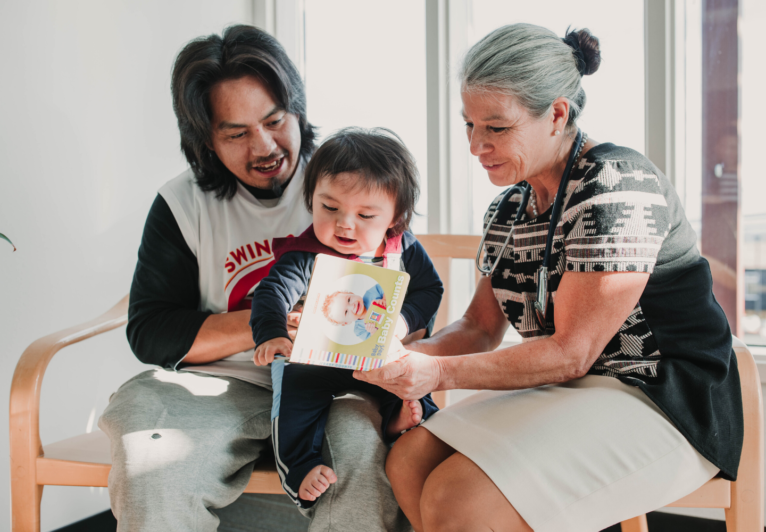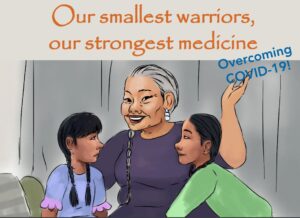Doctor Lydia Kim at Northern Navajo Medical Center in Shiprock, New Mexico says COVID-19 hit Navajo Nation hard and fast, but that while the news stories focused on death and devastation, what she hopes to take from the pandemic is the creativity, resilience, and strength of the Navajo community. Dr. Kim gives the example of one of the speech therapists at her hospital, Joshuaa Allison-Burbank, who worked on a children’s book—Our Smallest Warriors, Our Strongest Medicine— for Indigenous children affected by the COVID-19 pandemic; they now distribute this book to the families they see during well-child checkups. Doctor Kim and her colleagues have also been promoting and celebrating the Navajo language Dine. They have been distributing books that celebrate Dine traditions, such as First Laugh — Welcome, Baby! Dr. Kim says, “It is especially meaningful to our families to get a book that celebrates their traditions and culture.”
“It is especially meaningful to our families to get a book that celebrates their traditions and culture.”
Dr. Lydia Kim at Northern Navajo Medical Center in Shiprock, New Mexico
Indian Health Service and Brindle Foundation are two of the key partners that provide integral support to our network of 215 American Indian and Alaska Native Medical Sites. An expansion in our partnership this year with Indian Health Service means we will be able to distribute 7,800 additional books (for a total of 18,256 books) during American Indian and Alaska Native well-child checkups. Doctor Daniel Coles at Santa Fe Indian Hospital has been incorporating Reach Out and Read into his practice for 14 years. “Talking to parents about the benefits of reading with their children is empowering. These discussions provide a natural entry to discuss other issues like good nutrition and video limits in a positive and proactive way.”
The delivery of Reach Out and Read at Santa Fe Indian Hospital and Northern Navajo Medical Center provides a model to show how promoting early literacy during well-child checkups threads together powerful services at the intersection of alleviating health disparities, addressing social justice, and providing a pandemic response. Because we work within the pre-existing medical system, we thrive at providing our early literacy prescription to high-need and traditionally hard-to-reach populations, including children from rural and indigenous families. Reach Out and Read is a crucial source for high-quality inclusive and diverse children’s books that are so important for pediatric clinicians to share with their patients and families in combating the public health crises of racism and poverty. Books serve as mirrors to children, providing reflections of themselves, as well as windows, letting them see others and their experiences from a young age.
Dr. Kim says that she was recently in the clinic with a nervous 2-year old. She approached him with one of her favorite books, In My Neighborhood. She says, “I opened to the page that shows a doctor’s office. I pointed out all the same things in the picture as there were in the exam room — the exam table, the sink, even a lady doctor, just like me! He was in awe that this book illustration looked just like real life. I could see his nervousness melt away, and his curiosity and playfulness come out. It was a nice moment for all of us — mom, my patient, and me, to be reminded that books can comfort kids (and adults) in new and scary situations.”
The pandemic has made young children more invisible than ever, yet the pediatric well-child checkup ensures that we are getting eyes on these children, making sure that they are okay and telling their families that they are going to be okay, and encouraging their families to read, cuddle, and sing with them every day. While so many other routines and systems have disappeared, Reach Out and Read is still powerfully preparing children for kindergarten. In extraordinary circumstances, Reach Out and Read is stepping up to meet the needs of our families and the pediatric care providers who serve them. In our traditional model, healthcare providers talk with families about the importance of reading aloud together, suggest and demonstrate developmentally appropriate ways to share stories, and give each child a book to take home – all during routine well-child visits. COVID-19 reinforces the importance of this work; it has never been more vital to strengthen family bonds and help children feel loved and secure.
Dr. Kim says, “Here on the Navajo Nation we are hoping to prepare our patients for school readiness; bringing a book into the clinic room and encouraging our families to read together is one of the best gifts we can give our community.”


